Când mă gândesc înapoi la nașterea lui Luca și zilele acelea de noiembrie petrecute în spitalul Bucur, mă cuprinde o tristețe uriașă – și un fel de greață dezarmantă. Au trecut 4 luni de atunci și îmi fac curaj să scriu, ca să trec odată peste episodul ăsta.
Pregatiri. Tensiune.
Cu doctorița mea preferată, în care am încredere și care mă știe de când aveam 17 ani, am stabilit tot ce se putea stabili dinainte: am convenit că aș vrea să nasc natural (la cât sport fac, n-ar trebui să fie o problema), am pus în calendar termenele de consultație, ecografiile fetale morfologice, analize de sânge.
Mi-a recomandat cursul de puericultură.
Următorul punct – unde să nasc? Am fost împreună, ca viitori părinți, și ne-am uitat la o clinică privată. Apoi la maternitatea de stat. Diferența în costuri: minim 2’000€. Ca impresie, maternitatea Bucur părea serioasă, avea un aer heavy-duty, nu mult mai ponosită decât clinica privată, excepție făcând sala de așteptare de la parter. În rest, poate pentru că era o duminica după-amiaza liniștită, totul părea în ordine. Asta m-a convins: doctorița “mea” e de acolo, va fi în largul ei cu personalul, maternitatea e aproape de noi și Andrei va putea merge ușor acasă, fără să traverseze orașul petrecând ore în sir în trafic. În fond, nu în calitatea brioșelor din cafeneaua spitalului se măsoară calitatea serviciilor acestuia, nu? Iar dacă e să iasă cu complicații, în final tot la spital ajungi. Să mergem pe siguranță, deci.
Cred că am mers cu bicicleta până în luna a 5a. Vara a trecut fară mare bătaie de cap, am mers la înot până în ultima săptămână dinainte de naștere, am făcut regulat yoga prenatală, ca să mă mențin în forma și să mă pregătesc pe cât posibil. Mi-am văzut prietenii, am făcut lucruri frumoase împreună, m-am obișnuit treptat cu corpul ăsta nou, mare și umflat, apoi cu mișcările bebelușului. Pe la jumatea sarcinii, specialistul în ecografie fetală care fusese atât de drăguț cu noi a murit. Una din ecografii, precum și testul Harmony (de sânge, pentru a detecta Down-Syndrome, fără amniocenteza) l-am făcut în Germania, unde toată excursia până acolo plus consultația plus încă câteva zile de sejur au costat mai puțin decât cei 1’000€, cât ar fi costat testul[1] aici.
Mi-am luat vitaminele, am citit literatură, am pus întrebările la curs, am căpătat răspunsurile, am așteptat ziua cea mare. În ultimele săptămâni, zilele parcă se târau. Știam deja că vă fi băiețel, că vă fi mare, că se vă naște probabil la început de noiembrie sau chiar sfârșit de octombrie. Priveam înainte cu încredere, parca mă împrietenisem cu graviditatea asta, chiar dacă la început îmi picase greu.
Vine săptămâna 40 și odată cu ea niște migrene teribile, plus tensiune ridicată. Colul lung și închis că-n prima zi, mult așteptatele contracții ioc, așa că stabilim împreună cu doamna doctor un termen limită: dacă nu se întâmplă nimic până joi, 2.11., cezariană. M-am întristat puțin, parca “nu reușisem” ceva ce le iese atâtor alte femei, dar nu e cazul să faci pe eroina când riști sănătatea fătului cu tensiunea. În fond, și eu m-am născut prin cezariană – și mama nu e o bleagă.
Încă un drum pe la camera de gardă cu 2 zile înainte, tot din cauză de tensiune și migrene – parcă îmi pulsa un ochi de durere – și concluzia e clară. Joi, 2.11, la 6 dimineața, ne prezentam la cezariană.
În seara dinainte am lucrat până după 10, eram agitată, să termin la timp o evaluare și să mă distrag puțin, dacă tot nu pot dormi. Motanul casei mi-a simțit și el starea, tot dădea târcoale mesei de lucru aiurea. Nici nu le-am mai spus alor mei, ca să nu se agite și ei. Am convenit că Andrei îi sună de cum intru în operație.
Ziua cea mare. Joi. Zâmbetul.
Am plecat spre spital la 5.30 dimineața, pe întuneric, cu fluturi în stomac: azi o să-mi văd bebelușul! Da, o să “mă taie”, dar o să văd bebelușul, până la urmă au mai trecut atâtea alte femei prin asta! Aveam totul la noi: geanta cu hainele mele, geanta mica cu haine și scutece pentru el, un bax de sticle de apă de jumătate de litru, cum s-a cerut. Sperasem până în ultima clipa că poate se rupe apa sau se mișcă ceva, dar copilul mișcă din ce în ce mai puțin. Am aflat ulterior că nu mai avea loc să se miște, fiind atât de mare. Și că nu ar fi ieșit nicicum “pe jos”, cum nu ieșisem nici eu, nici bunicul și frații lui, decât cu mari complicații, în cazul lor.
La camera de gardă, o muiere plictisită și prost dispusă a lătrat la mine că ce vin la ora asta. Așa mi s-a spus, pentru a pregăti totul până în ora 9, când voi naște. După vreo 45 de minute în care nu s-a întâmplat nimic, dar Andrei a trebuit să aștepte pe hol, a venit o doctorița tânără, care era de gardă. A completat plictisit-drăguță formularul, în timp ce muierea plictisită se slugărnicea pe lângă ea, încercând să o entuziasmeze pentru niște bârfe. Vream apă, aveam frisoane, Andrei stătea degeaba pe cealaltă parte a ușii, în hol, aici nu se mai întâmplă nimic, în afara de lătratul ocazional al asistentei către mine. Mi-a scris cu un marker gros codul pe cardul de sănătate, fără să întrebe. Mă întrebam cine s-o crede femeia asta, încât să se poarte așa necioplit. Poate a avut o gardă grea, dar eu m-am purtat frumos și nu e cazul să latre așa la mine.
După încă o oră, m-au trimis într-o cămăruță pe hol să mă schimb. Aveam pregătită o cămașă mare cu nasturi, care însă părea deodată foarte scurta și parca mă lasă despuiată pentru drumurile acelea interminabile pe holuri, pe lângă portar și alti oameni așteptând. Andrei venea după mine, cărând geanta – unde trebuia pusă, nu știam ce trebuie făcut, întrebam. “O să aflați la timpul potrivit”, lătra cineva.
Rază de soare: vine doamna doctor, caldă și zâmbitoare. Mă duce într-un salon în care alta femeie, mare și blândă, așteaptă să nască în fine. De ieri are contracții și tare și-ar dori să fie operata și să îi lege doctorul trompele, că e de la țară, mai are 3 copii mari din alta căsătorie, chiar nu mai poate face acum încă unul. Poate găsește un doctor înțelegător?
După jumătate de oră, pasul următor: merg în alta cameră, e monitorizată sarcina, se pare că totuși am niște contracții inegale, vagi. 2 asistente drăguțe glumesc pe seama aparatelor, dna doctor îmi explică ce urmează ca procedura. Se pregătește sala de operații.
Vine momentul. Îi spun lui Andrei la telefon că acum intru în sală, el mă întreabă dacă are oare timp să ducă un pisoi abandonat la veterinar, eu îi spun că nu știu, dar să fie acolo când ies, el urmează să îi sune pe ai mei.
La ușa sălii, pun telefonul în sacoșă, nu știu ce să fac cu sacoșa, dar e ok, din sală vine muzică și o atmosferă proaspătă, aici o să nasc, ce alegere bună, curând voi cunoaște în fine bebelușul pe care îl car în mine de atâta timp.
Iese o infirmieră cu o lamă și-un castronaș în mână și întreabă dacă sunt rasă jos. Da, epilată chiar. “Să văd daca e bine”. Vede, e ok, nu spune nimic, pleacă. Intru în sală, lumina verde, muzică buna, echipă zâmbitoare, sunt vreo 7 femei.
Vine anestezista, se prezintă, îmi explică cum vă face rahianestezia, socotește dozajul – “mai mult, că e atletică”. Mă întinde pe masă, îmi pune sonda, totul e “comfortably numb”.
În jur se aude conversația în surdină a echipei, muzică buna, nu miroase a nimic special. Prima mea operație!
Începem, mă gândesc. Mă uitam în tavan și la lumină, știam de la prietene cam cum ar trebui să fie, așteptam să simt ceva, fizic sau emoțional. Durează; aud mormăieli că trebuie mai mult. Mă întreb dacă fac totul bine. Ce aș putea să fac? La un moment dat, am simțit cum mi se mișcă bazinul de colo-colo, atât de tare au trebuit să tragă. Mai trece ceva timp, în care visam cum o să mă joc în fine cu bebelușul, când ajungem acasă, după toate astea – și gata: mi-l aduce deodată și mi-l arată: ochi de chinez, bebelușul râde, nu plânge, ce mă bucur, e de-al meu! Apoi îl duce de acolo.
După operație
Vin brancardierii, mă duc în salon la reanimare, mă mută cu pătură pe alt pat. O să înceapă să doară curând, zice cineva. Eu vitează în continuare, mi se pune branula ce o fi în ea?
Peste o oră e adusa următoarea cezariană. Cineva mi-aduce și geanta, cu telefonul, vorbesc cu Andrei, “ți-a adus bebelușul?” nu încă, nu prea știu ce să spun. Suntem trei într-un salon minuscul. Aveam să constat că e unul bun: în alt salon sunt câte 5 sau mai multe femei. Dar sunt peste 28 de grade în cameră. Geamul trebuie să rămână închis, “să nu se facă curent”. Căldură nu se poate regla.
Ziua trece încet, sunt semi-amorțită. Precis diseară voi vedea bebelușul.
Seara însă e prea târziu, nu mai aduce nimeni bebelușii la ușa neonatologiei de la etaj să ni-i arate. Nici pe Luca. Macar i l-au arătat lui Andrei, care mi-a trimis poza lui pe telefon. Spre seară ne dezmeticim încet, toate lăuzele, apoi vine doza de medicamente în branulă. Dorm. Sunt lăuză. Corpul se simte străin. Mâine e ziua cea mare în care voi tine în brațe bebelușul.
E noaptea în care dorm cel mai bine din toate ce au urmat în spital, probabil încrezătoare și îmbuibată cu diverse substanțe.
Ziua 2. Vineri. Urina.
Mă dezmeticesc dimineața devreme, cred că e 6. Se aprinde lumina, foiesc infirmiere și asistente, eu nu știu să le deosebesc. Azi văd bebelușul, în fine! Cum o arăta?
Celelalte tipe din salon sunt ok, una are unghii lungi și false, a născut cu o zi înaintea mea, cealaltă e miniona și vlăguită. Prima e îmbrăcată în negru și roz, cealaltă în vernil. Parcă și ochii lor sunt tot așa. Peste două ore vine o infirmieră să ne ajute să ne îmbracăm, “mobilizăm”. E atât de cald încât simpla idee să mă îmbrac în ceva care o să se lipească de mine ca la tropice mi se pare respingătoare. Ceva mi se prelinge între picioare, dar pare să fie “monitorizat”, deci sub control. Toată lumea are sondă, că nu putem merge încă la toaletă. Știam că te refaci mai greu după cezariană, iar asta e parte din refacere. Să ne mobilizăm. Asistenta spune, “daca vă mobilizați, în 2 ore vă dam bebelușul.”
Într-o cămașă bleu-gri-guguștiuc, pornesc pe hol ca un soldățel cuminte, cu punga de urină în mână, ținându-mă de pereți întăi, apoi încet-încet până la capătul holului, îmi pare că am mers până la Predeal pe jos și mă întreb daca mai am energie să mă întorc. Se cam învârte totul cu mine, dar – în 2 ore îmi da bebelușul în brațe daca mă mobilizez. Constat că burta mea e cam la fel de mare că pe când era copilul înăuntru… O să mai dureze ceva…
Mă întorc și mă las încet pe pat. 2 ore. Parcă mă jenează sonda.
Povestea se tot repetă până seara: treptat-treptat mă descurc mai bine, merg din ce în ce mai repede, urc și 2-3 trepte, ca să arat că pot. Nimeni nu-mi spune că de fapt nu mai sunt locuri azi în rezerve și oricum ar rămâne să mă mut abia mâine. Când văd bebelușul? Așteptați, vă mai mobilizați…Ce o fi făcând Luca în timpul asta? Doarme probabil. Cum o fi el? Dorm și eu. Timpul se târaște.
Când întreb o femeie în halat cu o față de nevăstuică, “când pot vedea bebelușul?”, îmi raspunde, “când va fi cazul”.
“Dar asistenta a spus că peste 2 ore, dacă mă mobilizez…”
“Infirmiera, vrei să spui!! Asistentă sunt doar eu!” latră ea la mine cu o privire de parcă i-am insultat neamul întreg. Nu mai spun nimic și aștept.
Andrei trece să mă vadă; ai mei toți vor să știe cum e bebelușul. La mine se instaurează încet un sentiment de jenă, de vinovăție. Nu l-am văzut nici până acum decât în poza de pe telefon, la care mă tot uit încercând să ghicesc ceva. Trimit poza tuturor. “Când să te vizitam?” întreabă ei. Nu stiu… Stai întăi să primesc odată copilul în brațe.
Se lasă noaptea, se schimbă personalul iar. Iar întreb, iar nimic. Mâine, spune o asistentă voinică și hotărâtă. Dorm. Mâine în fine voi ține în brațe bebelușul născut ieri…
În toiul nopții vine garda: se aprinde brusc lumina, intra o doctorita slabă cu buze strânse, un doctor înalt și grizonat, urmați de un cârd de asistente și infirmiere foarte atente la ei. Ajung la mine și dezbat ce e de făcut: de atâta mișcare, mi s-a colorat ușor urina din punga sondei. Asistenta voinica și drăguță așteaptă verdictul: daca să mă curețe cu betadină sau apa oxigenată, pentru a se vedea ce e cu sonda. Cinci capete dezbat privind la mine între picioare la 3 dimineața. Eu întreb când o să văd bebelușul.
Asistenta dă în fine cu apă oxigenată, dar trece puțin mai tare peste o labie și eu tresar. “Ce te smiorcăi?!” latră doctorița. Rămân uimită de asemenea ton. Tocmai eu, care am mărșăluit toată după-masa pe hol, indiferent cât durea, ca să văd bebelușul “peste 2 ore” care s-au lungit iar până mâine? “Am tresărit, atâta tot.” Doctorița îmi ține o lungă pledoarie răstită despre cum a născut ea 2 copii și nu s-a smiorcăit niciodată.
Între timp, îmi schimba sonda pe viu, trăgând și punând apoi una noua – de ce alta? Când puteam să mă duc între timp la toaleta bine-mersi. Probabil de supărare, o înfige atât de tare, încât mă rănește de-a binelea. Mai mult sânge în urină. Monitorizăm. Încep să nu mă simt bine, dar mă agăț de amintirea zâmbetului din sala de operație. Bebelușul meu.
A treia zi. Sâmbătă. Sânge.
Mă chinui să dorm, mă simt vinovata și neputincioasa, mă trezesc, același ritual. Când pot să văd în fine copilul? Rând pe rând, fetele din salon sunt mutate în rezerve, rămân singură, sunt aduse “cezariene” noi. Asistenta drăguță mi-aduce o cafea.
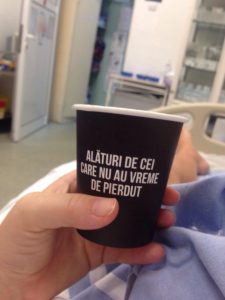 Trece tata, care se amuză povestind cum i-a reparat o unealtă portarului și a fost lăsat să intre fără mari întrebări. Deși e weekend, deci program de vizitare de la 10 dimineața la 8 seara. Tata a adus ceva bun de mâncare de la mama. Mă chinui să nu fac o față disperată, pentru că azi ar fi fost ziua în care aș fi putut primi vizite în rezervă, cu bebelușul alături. Îi spun că aș vrea să iau copilul în brațe. Îmi spune că sigur e ok, mai e un pic, cine știe ce motive au ca să mă țină așa, o fi mai sigur. Pleacă și – iar se târăsc orele…
Trece tata, care se amuză povestind cum i-a reparat o unealtă portarului și a fost lăsat să intre fără mari întrebări. Deși e weekend, deci program de vizitare de la 10 dimineața la 8 seara. Tata a adus ceva bun de mâncare de la mama. Mă chinui să nu fac o față disperată, pentru că azi ar fi fost ziua în care aș fi putut primi vizite în rezervă, cu bebelușul alături. Îi spun că aș vrea să iau copilul în brațe. Îmi spune că sigur e ok, mai e un pic, cine știe ce motive au ca să mă țină așa, o fi mai sigur. Pleacă și – iar se târăsc orele…
După masă vine Andrei. Am urcat cu el – și fară el – la etaj de atâtea ori, acolo, unde după o ușa de sticlă sunt bebelușii… Însă nu prea aveam cui să cerem nimic. Au trecut 48 de ore de la operație deja. Odată am cerut hotărați să-l alăptez, dar ne-a întrebat asistenta de acolo în ce rezerva sunt și nu am știut să spun. S-a prins că sunt încă la reanimare și a zis “Vă credeți la privat aici sau cum? Nu aveți voie să alăptați daca mai sunteți încă la terapie intensivă. Cine știe ce medicamente aveți în corp. Nu riscăm.” Deși sunasem intre timp pe doctorita mea buna și drăguță, care a spus că nu e contraindicată alăptarea, dar…pe tura asta nimeni nu-și asuma răspunderea!
“Să bei multa apa, ca să se curețe urina mai repede” mă sfătuiește asistenta drăguță și voinica.
Încep să beau apa, dau gata sticlă după sticlă , urina e tot rozalie. Doctorul de gardă spune că nu e încă bine, mai încearcă. Hai, că azi iți dam bebelușul. Mai capăt o punga de ser în branulă. Ca premiu, îmi scot în fine sonda..!
Acum situația trebuie monitorizata atent și mi se spune să beau mai multă apă, ca să se curețe urina, și să merg din oră în oră la toaletă. Unde e musai să fac într-o sticla, păzită de o infirmiera stahanovistă care mă observă atent, ca să nu fac vreo trăznaie, în timp ce fumează pe geam. Nu există capac de WC, sticla rămâne după ușă sau uneori trebuie le-o arăt asistentelor, care se poartă de parca aș fi făcut ceva greșit. Îmi spun că “uite câtă încredere avem în tine, faci singură la WC”.
La anul fac 40 de ani. Am fost în Haiti și în India, am văzut mizerie destulă și m-am descurcat, nu e un capăt de tara, mă descurc și acum, vreau la bebelușul meu, sunt dispusă să fac orice. S-o fi întâmplat ceva cu el și asta e doar teatru, ca să îl repare între timp? Când pot să-l văd în fine? Ajunsesem să întreb pe oricine.
Geamul de la WC e deschis mereu, pentru că aici se fumează ca la liceu. E frig și pute și mă chinui cu sticla. Cineva spune că era mai dură doamna doctor de azi noapte, pentru că a pierdut pe unul din copii. Dar eu nu am nici o vină. Ce o face Luca acum? Au început să mi se umfle sânii din ce în ce mai rău, când stăteam în pat, laptele curgea prin țesătură. Colostrul, ce ni s-a spus la curs că e cel mai important. La toaleta mă întâlnesc cu fetele care erau înainte în salonul meu, abia se țin pe picioare. “De ce nu ți-au dat încă bebelușul? Ești mult mai bine ca noi.” Nu mă lasă nici să-l văd, mi-au dat lacrimile. Câți bani le-ați dat voi ca să vă dea în fine bebelușii în rezerva? Îmi rămân cuvintele în gât. Ies pe hol.
Din când în când vorbesc cu ai mei, încerc să le dau impresia că totul e ok. Să nu sufere și mama. Dar probabil mă simte. Nu știu pe cine să întreb ce să fac ca să ies odată din situația asta. O asistentă (infirmieră?) care fumează la WC rezemându-se pe o matură îmi spune, “hai, mai încearcă, acum avem rezervă liberă, e goală, te așteaptă numai pe tine – dar nu e după mine”.
Încerc! Încerc! Beau sticla după sticla, sunt 5 litri de apa deja și 1,5l de ser au curs prin branulă. Îmi explodează sânii în curând, creierii, totul, îmi vine să mă așez pe jos în WC, în sânge și-n urină, mizeria umană e mai rea decât orice.
Când se uita la mine, asistenta spune, “nu mai face așa o fata, că sperii colegele de salon, de ce să sufere și ele? Ce-ai? Te pomenești că ai făcut vreo depresie post-natala!”
“Vreau să-mi văd bebelușul, au trecut trei zile deja de când am născut!”
“Toate la vremea lor, nu e după tine, toți avem bunavoință, nu vezi?”
Laptele picură prin cămașă, pe picior, urina e tot rozalie. Mă gândesc să o diluez cu apă, dacă tot mă bănuiesc nebunele astea.
Andrei vine disperat: paznicul de la poartă i-a spus că nu poate intra la mine, că “duamna e pe masa de operație”. (De fapt, nenorocitul voia bani de o cafea! Dar nu știa cum să îi ceara altfel.)
După ce-mi povestește asta, Andrei începe să mă întrebe dacă poate nu facem destul, poate nu cer răspicat ce vreau. Trebuia să întreb mai devreme doctorița. Ferm! Trebuia să treacă peste mine și să o sune el. Am întrebat, am cerut! Dar nu destul de răspicat, spune el. Prea târziu, mă gândesc eu.
“Ți-au pus prost branula, se sparge vena în curând, uite.” Asistenta mută branulă pe mâna cealaltă, mormăind despre incapabilii care lucrează aici. Câtă apă mai beau? Ce fac cu laptele ăsta? Când îmi dați bebelușul?

Seara la zece și ceva, când nu mă mai așteptam, trece o prietena bună cu consortul, spontan. Nu știu cum face, dar o lasă la etaj la Luca! Mă vede disperata și aranjează cu asistenta mare, care vorbește cu asistenta de sus și mi-aduc bebelușul, înfășurat într-un scutec uriaș ca într-o față de perna. Se fac poze, îmi vine să plâng de fericire. E prima oară că îl iau în brațe pe Luca! Există speranță, mâine sigur mă mută în rezervă și mi-l dau. În fine!
Mai e o noapte, parcă cu moralul mai sus, încerc să amușin dacă s-a păstrat puțin miros de bebeluș pe cămașă, mă uit la poză până mi se împăienjenesc ochii.
Adorm în fine.
Ziua 4. Duminica. Lapte.
Azi nu se fac externări! De asta nu se eliberează rezerve și de asta nu mă mut nici azi! Când am aflat asta, m-a apucat o disperare profundă și grea. E nedrept, nu mai pot sta decât pe spate de atâta lapte, un etaj deasupra mea, unde nu am voie, copilul meu e hrănit cu biberonul și eu nici nu am voie să-l țin în brațe.
La cele doua lăuze din salon vin pe rând doi popi și o matroană voinică, se asează toți pe rând direct la mine pe pat, fară halate și fară să-ntrebe. Popii vin după slujbă, precis s-au frecat de ei vreo 200 de oameni deja, iar asta e o secție de terapie intensivă! Cu sânge și lichide la vedere. Geamul rămâne închis, sunt 30 de grade, vreau măcar să mă pot dezbrăca.
Trece doctorița mea, caută o soluție, trebuie să mai am un pic de răbdare, mă apuca plânsul, vreau să scap odată, încep să mă întreb daca sunt într-un coșmar și de fapt nu am născut încă. Încerc pentru a nu știu câta oară să citesc un pasaj din memoriile lui Hadrian, dar văd că nu mai pot descifra rândurile. Plâng în surdină cu fata la perete, ca să mă lase odată în pace infirmierele cu observațiile lor cretine despre cum supăr colegele de salon cu purtarea mea ciudată, depresivă. Am ajuns la “learned helplessness”. Tot nu am voie la Luca! Deși acum nu mai e nici urina, nici nimica!! Cer să-l alăptez și mi se spune, “să vedem. Nu știm dacă putem prelua această răspundere, dacă Dvs. sunteți încă la reanimare…”
Fac o criză de furie, care se schimbă în bocit, anunț familia că nu vreau să văd pe absolut nimeni până nu iau copilul în brațe. Stau cu fața la perete și bâzâi în gol. Când o să se termine în fine? Într-unul din rândurile când mă duc sus să cerșesc copilul, aflu că a făcut icter, deci oricum l-ar ține sub lampa UV, deci e mai bine pentru mine să mai aștept…
Mă scutur și mai încerc odată. Până la urma aflu că mi-l vor da la alăptat! La 3 ore odată să urc la etaj să îi dau lapte. Însă sânii mei nu mai fac fata, s-au înfundat căile mamare, engorgement, trebuie pompe și masaj și moașe iscusite ca să-și dea drumul.
Trece doctorița mea și face în fine posibil să fiu mutată într-un salon. Însă e îngrijorată de cum mă vede, se miră de povestea cu sonda, vede vena spartă și brațul umflat și decide să nu stau singură, așa că mă muta într-un salon cu alta tipă. Frigider! Mai puțin de 30 de grade! Aer! Unde e Luca?
Așa întâlnesc o moașă drăguță care mă ajuta mult. Ei îi povestesc pasul meu, cu toate complicațiile. După 8.5 ore de masat și tras de sâni cu 2 moașe și consortul, (“de ce nu te mulgi singură, ar fi mai ușor!”), cu lapte țâșnind pe pernă și cearșaf, curgând pe jos, umplând pahare care ajung la chiuvetă, în fine situația e cât de cât restabilită, laptele curge, cu mari dureri, iar la vale.
Mă duc în salonul de alăptat, mai devreme decât celelalte mămici, pentru că trebuie să stau întâi câte 20 de minute la mulgătoarea electrică, “să dea drumul la sâni, că-s angorjati și bebe nu poate trage”.
Acolo sunt niște femei care se știu bine intre ele și pompează o cantitate plina într-un sfert de ora într-un recipient. Apoi dau laptele la un ghișeu și pleacă, fiind înlocuite de cele care alăptează normal bebelușii, pe care-i primesc de la același ghișeu. Într-un rând, primele s-au luat de mine că vin și-mi pun șorțul de alăptat pe piele, nu peste haine. Că e neigienic și să-mi fie rușine de nenorocită. Rămân cu gura căscată la atâta ură, dar tot nu înțeleg nimic.
Aveam să aflu că ele sunt mamele bebelușilor de la terapie intensiva, prematuri și cu probleme. Toate, fară excepție, sunt fumătoare înrăite, care pleacă de la muls repede la o țigară în fața spitalului, în stradă.
Aceste femei vin mereu la și jumătate, apoi la ora întreagă vin cele care alăptează. Cea mai drăguță e o roma de 16 ani, cu un copil mic și cuminte, cu ochi mari și care bea cel mai bine. Prunăreasa. Cea mai tristă e…femeia care era de miercuri în salon. A născut abia sâmbăta, natural! După 3 zile de contracții tot nu se dilatase mai mult de 9 și până la urma a reușit așa. Bebelușul ei e singurul mai mare decât Luca, are 4.6 kg și e așa obosit în urma travaliului încât nu poate suge. Femeia se mulge disperată și pune în biberon, în timp ce copilul îi atârnă moale în jos pe genunchi, dormind mereu.
Luca e ca o omidă cuminte, înfășat până la gât, abia crapă ochii nopțile, dar bea bine. Parcă nu mă pricep deloc, uneori mă întreb daca oare îl țin bine, cu coloana în ax, când alăptez sau e cu capul răsucit la spate, ca o bufniță?
Mă simt ca un animal neajutorat și îi vorbesc copilului, mai mult ca să mă liniștesc și poate ca să bea mai bine. “De ce îi spuneți “piticule”? că doar e uriaș…” întreabă Prunăreasa de lângă mine. “E de doua ori cât al meu…”. “Păi dacă l-am făcut târziu, e mare, na.” Văd că încep să-mi revin încet, daca mai încape și loc de glume.
Ziua 5. Luni. Hârtie.
Ziua următoare e luni. După alăptarea de ora 6 și 9, sunt mult mai încrezătoare: azi se fac externări!
Luca e livrat în rezervă pe la 10, fară vreun avertisment. E așa mic și adormit și totuși e uriaș pentru un bebeluș. Nu înțeleg cum încăpea în mine acum 5 zile. Cică a făcut torticolis, tocmai pentru că nu mai încăpea bine și stătea înghesuit.
Dacă ne dă voie…am putea merge chiar azi acasă. Îndrăznesc să sper. Așa aflu că avem neonatoloagă, văd cine e, aflu că a întrebat din prima zi “unde e mama acestui bebeluș?” și i s-ar fi răspuns mereu că “dna Hasnaș e prea slăbită ca să se dea jos din pat”! Nu primește bani. Am uitat de anestezistă.
Ce multe s-au întâmplat zilele astea, parcă n-o să mai fiu niciodată aceeași. O să rămân cu aminitirea că m-a frânt sistemul în cel mai nepăsător mod. Că n-am știut să mă descurc mai bine, că am fost o fraieră de bună credință, care a luat de bun ce spunea orice troală. N-am știut poate cui și cât să dau și am încurcat algoritmul, de aceea a dat cu virgulă… Am făcut în schimb tot ce mi s-a cerut. Ce naivă.
Când vine Andrei, îi spun, “luăm copilul și fugim!”. Totuși să facem actele, spune el. Se duce la toate instanțele necesare, de unde mă suna să mă întrebe despre numele facultății absolvite (doamna care completează formularul nu crede că așa se cheamă facultatea din Karlsruhe) și despre religie (doamna nu poate scrie “ateu”, “că doar ești botezat!”) și vine înapoi cu o poveste complicată: când era acolo în birou, au dat buzna peste el bodyguarzi care puneau presiune pe doamna incredulă să completeze un certificat de naștere pentru un tată minor, care a făcut copil cu o majora și acum nu poate semna actele. Pentru că e minor și părinții sunt la munca în Spania. …Bodyguarzi!
Avem actele, avem copilul, ne luam rămas bun de la colega de rezervă și fugim.
Afara mă mai uit odată la spitalul de coșmar. E lângă Colectiv. Fugim acasă, sunt frântă.
Acasă mă uit la pachețelele pregătite cu atâta drag și generozitate de mama pentru asistente. Cafea, ciocolate fine. Îmi frânge sufletul. Nici nu am apucat să ne gândim la asta. Ar fi ieșit lucrurile altfel? Femeile alea se purtaseră rău, indiferent ce le dădusem.
Încep să despachetez hainele, vreau să desfac tot ce-mi amintește de acele zile, spăl câteva haine pe care nici nu le purtasem, arunc tot ce pot. Numai când văd ceva ce-mi amintește de spital mă apuca greața. Văd urme ale vieții mele dinainte de aceaste zile și-mi dau lacrimile, necontrolat. Ce iluzie e totul!
Copilul însă doarme liniștit. Nu avem nici cea mai vaga idee cum trebuie schimbat un scutec sau îmbrăcată omida. Motanul se uita îngrijorat la făptură care din când în când tresare în somn.
Mă simt de parca m-am dus până la piață să iau pâine și m-am întors acasă cu un lansator de rachete. Fară instrucțiuni de folosire, și toate rachetele-s armate, gata să explodeze. Dar suntem în fine acasă.
Mai târziu m-au ajutat: moașa-consultant de lactație, motivul pentru care am și azi lapte, după jumătate de an. Doctorița bună și drăguță, cu care încă nu am putut vorbi despre ce s-a întâmplat. Mama și tata, care au trecut pe la noi, practici și puși pe fapte, nu întrebări. Var-mea, în prima zi când a trebuit să plece Andrei de acasă. Cuplul genial care mă ajutase cu testul. Prietenele care au născut înaintea mea. Și încet lucrurile au intrat în normal.
Însă când mă gândesc că pentru a face încă un copil, ar trebui să mai trec odată prin asta, mi se face frig. Și greață.
[1] Testul, care e important pentru femei trecute de 35 de ani, costa in jur de 300€ in Germania, in Romania insa se pare ca o firma are monopol asupra procedurii si decide face pretul.
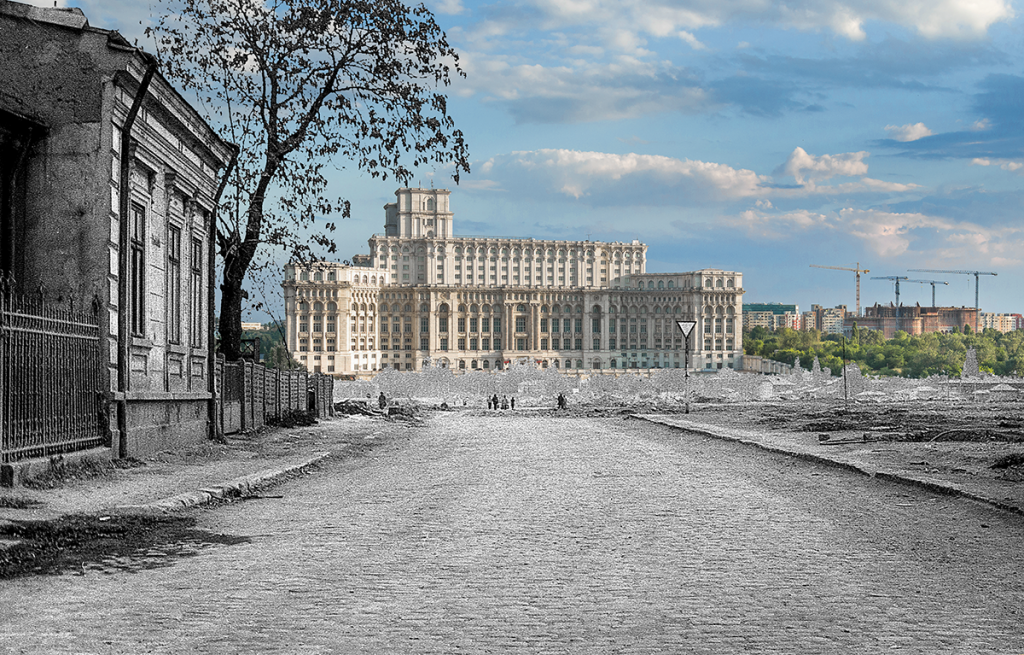 *Collage: Radu Manelici. Photo: Andrei Bîrsan, Ștefan Tuchilă
*Collage: Radu Manelici. Photo: Andrei Bîrsan, Ștefan Tuchilă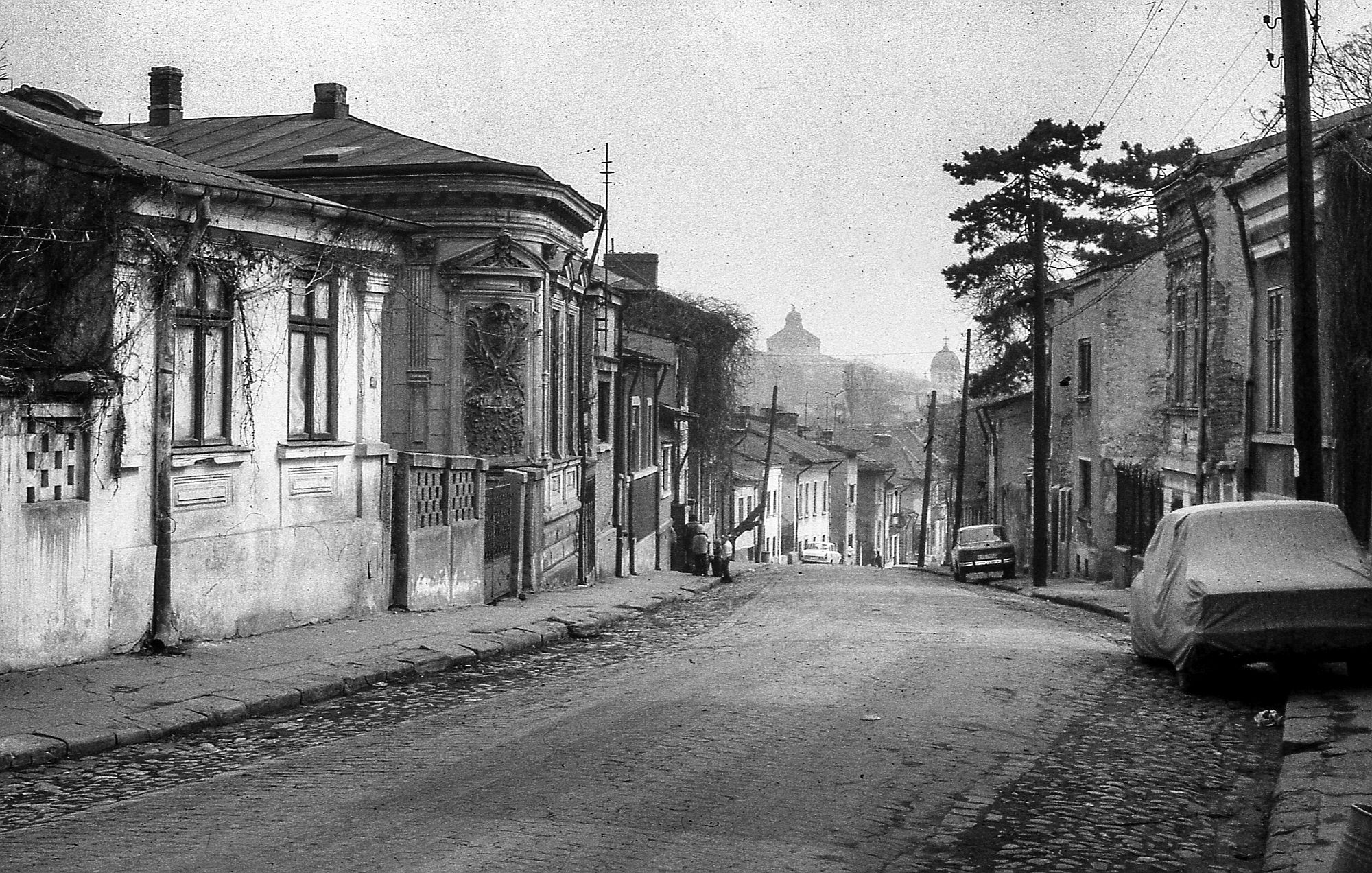 *Ecoului Street in the 1980s. Photo: Andrei Bîrsan
*Ecoului Street in the 1980s. Photo: Andrei Bîrsan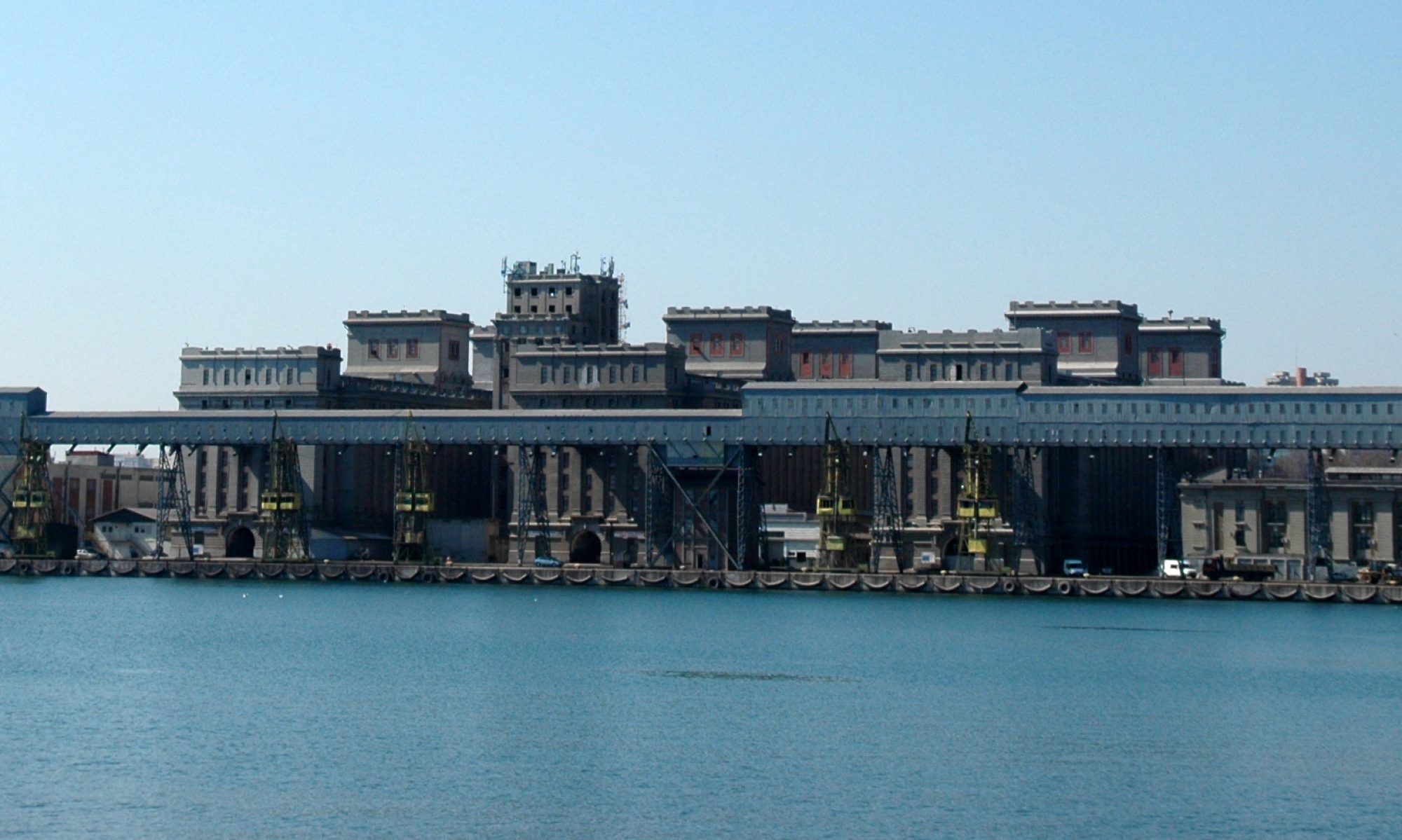
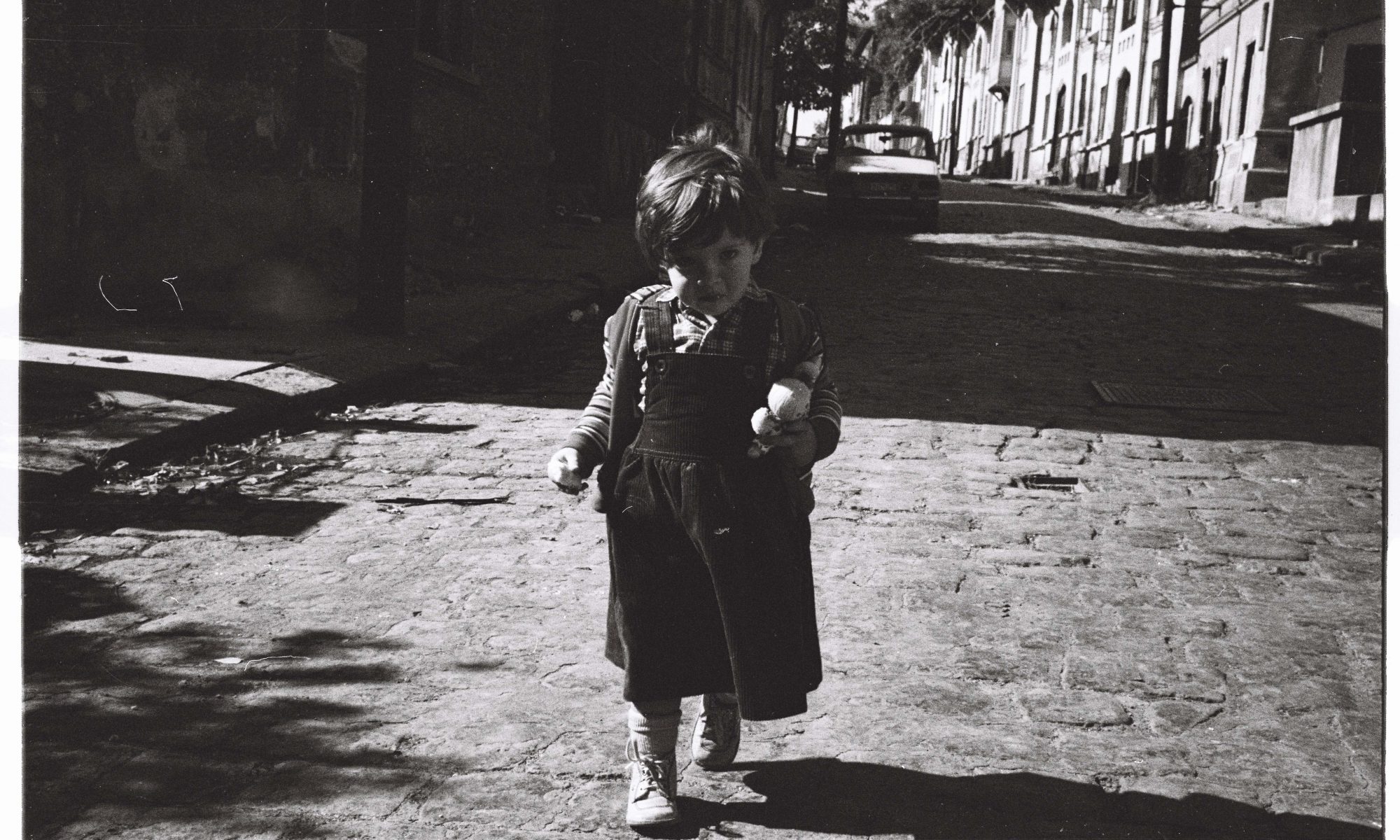
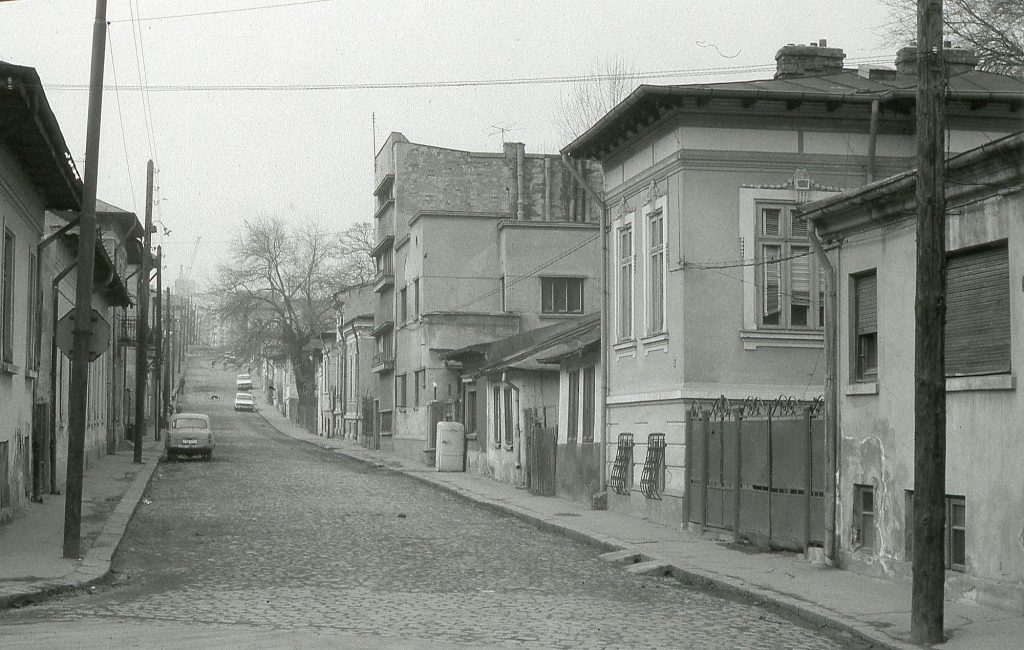

 Trece tata, care se amuză povestind cum i-a reparat o unealtă portarului și a fost lăsat să intre fără mari întrebări. Deși e weekend, deci program de vizitare de la 10 dimineața la 8 seara. Tata a adus ceva bun de mâncare de la mama. Mă chinui să nu fac o față disperată, pentru că azi ar fi fost ziua în care aș fi putut primi vizite în rezervă, cu bebelușul alături. Îi spun că aș vrea să iau copilul în brațe. Îmi spune că sigur e ok, mai e un pic, cine știe ce motive au ca să mă țină așa, o fi mai sigur. Pleacă și – iar se târăsc orele…
Trece tata, care se amuză povestind cum i-a reparat o unealtă portarului și a fost lăsat să intre fără mari întrebări. Deși e weekend, deci program de vizitare de la 10 dimineața la 8 seara. Tata a adus ceva bun de mâncare de la mama. Mă chinui să nu fac o față disperată, pentru că azi ar fi fost ziua în care aș fi putut primi vizite în rezervă, cu bebelușul alături. Îi spun că aș vrea să iau copilul în brațe. Îmi spune că sigur e ok, mai e un pic, cine știe ce motive au ca să mă țină așa, o fi mai sigur. Pleacă și – iar se târăsc orele…
 Walking through Predeal, the mountain resort where we went skiing when I was 7 years old, I find so many things have changed. The old sloped streets, once so familiar, are now lined with new villas, built mostly in a cheap nouveau riche style, so obvious for impressing and not for comfort. Nauseating amounts of money were buried in some disastrous designs. Their roofs are droopy with huge icicles, as if the people who built them were incapable of realizing the importance of proper drainage. Among the follies there still lie some abandoned old hotels I used to know rather well, a building that looked like a traditional inn, but also a newly built datcha-like thing with little onion tops, and a handful of raw concrete hulks stopped in the construction process, lying around gaped at the sky like stranded whale skeletons.
Walking through Predeal, the mountain resort where we went skiing when I was 7 years old, I find so many things have changed. The old sloped streets, once so familiar, are now lined with new villas, built mostly in a cheap nouveau riche style, so obvious for impressing and not for comfort. Nauseating amounts of money were buried in some disastrous designs. Their roofs are droopy with huge icicles, as if the people who built them were incapable of realizing the importance of proper drainage. Among the follies there still lie some abandoned old hotels I used to know rather well, a building that looked like a traditional inn, but also a newly built datcha-like thing with little onion tops, and a handful of raw concrete hulks stopped in the construction process, lying around gaped at the sky like stranded whale skeletons. And then there was this villa with the three-partitioned windows and green shutters with a cute little pattern. The entrance canopy looked intact, but one door was ajar. A window in the top floor was open, too. There were -6°C outside. A faded metal plate was still advertising for a soft drink no one under 30 has ever heard of. In a corner, the name, Vila Banta, was still visible, painted in black letters on golden background, adorned with the logo of the national tourism agency.
And then there was this villa with the three-partitioned windows and green shutters with a cute little pattern. The entrance canopy looked intact, but one door was ajar. A window in the top floor was open, too. There were -6°C outside. A faded metal plate was still advertising for a soft drink no one under 30 has ever heard of. In a corner, the name, Vila Banta, was still visible, painted in black letters on golden background, adorned with the logo of the national tourism agency.

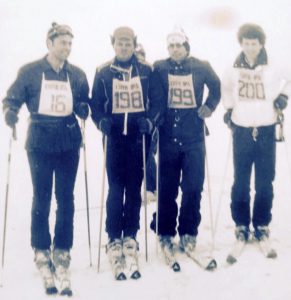

 A blue devil passed by
A blue devil passed by